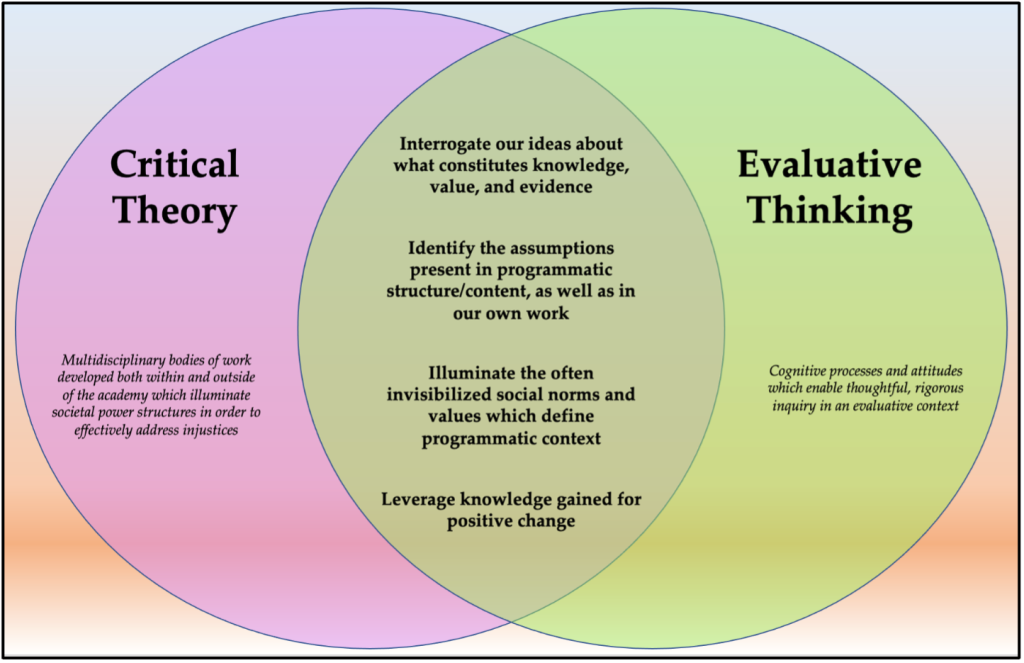Hi Everyone! Dylan Felt (she/her) here from the Evaluation, Data Integration, and Technical Assistance (EDIT) Research Program at Northwestern University. Today, I’m excited to be sharing a little bit about Critical Theory and why it matters so much in evaluation theory and practice.
If evaluation theory is “who we are” (Shadish, 1998), then Critical Theory is a framework for asking questions about how we relate to power – how it shapes our work, and how our work shapes it in return. Critical Theory is not just any one thing; it describes many different bodies of multidisciplinary theory which seek to identify and address how systems of power produce inequities and injustices in society. Even this conceptualization, however, tends to restrict Critical Theory to an academic context. In fact, theorizing through different lenses is something we all do, every day. Honoring voices from outside the academy, and the ways in which personal experience and narrative can challenge hegemonic power, is a central tenet of many critical theoretical traditions – particularly Critical Race Theory.
Ultimately, what unites so many traditions under the label Critical Theory is a shared commitment to looking at the world in new ways and pushing ourselves to think more deeply about it so that we can reshape it in a more just and loving form. It is about understanding power—and our relationship(s) to it—challenging dominant narratives about what is “normal” or “natural,” and bringing hidden power dynamics to light. Most importantly, Critical Theory is about action: it is a collection of insights we can deploy to heal both our societies, and ourselves.
Does any of that sound familiar? I hope it does – you might notice that some of the key elements of critical theory align quite nicely with Evaluative Thinking. Here’s one of my favorite definitions of Evaluative Thinking, distilled by Tom Archibald from his work with colleagues:
“Evaluative Thinking is a cognitive process in the context of evaluation, motivated by an attitude of inquisitiveness and a belief in the value of evidence, that involves skills such as identifying assumptions, posing thoughtful questions, pursuing deeper understanding through reflection and perspective taking and making informed decisions in preparation for action.”
When we take these two concepts and compare them side-by-side, we can see some important areas of overlap:

Image created by Dylan Felt. Please re-use freely with attribution!
While evaluative thinking promotes thoughtful, curious, and engaged practice, Critical Theory helps take our work to the next level. Critical Theory strengthens our Evaluative Thinking by pushing us to interrogate the foundations of our thought processes which we might take for granted, and to reach beyond the “normal” way of doing things in search of creative, liberatory alternatives.The traditions and practices of Critical Theory are an essential part of rigorous Transformative Evaluation work. It is only by critically examining context and power in our evaluations that we can develop a truly liberatory praxis which avoids (un)intentionally reinforcing systems of power.
Rad Resources
As I mentioned, Critical Theory isn’t just one thing, and so it should be no surprise that it’s made its way into Evaluation in more than one way. Below are two evaluation frameworks which I’ve relied on in my own practice and which draw on critical theoretical traditions. These are just two examples, with only a few of their critical practices listed. There are lots more out there! If you have other examples of how Critical Theory shows up in Evaluation that you’ve found useful or meaningful, add them in the comments on this post!
| Evaluation Theory | Example Critical Practices | Further Reading |
| LGBTQ+ Evaluation | Demonstrates how cis/heteronormativity shapes programmatic context, content, and activities. Illuminates assumptions about “normal” and/or “natural” experiences of sex/gender/sexuality, and reflects on how those assumptions show up in evaluation. Seeks to use evaluation as a tool to work towards LGBTQ+ liberation. | New Directions for Evaluation Issue 175: LGBTQ+ Evaluation (Felt, Perez-Bill, Glenn, & Phillips, eds., 2022) |
| Indigenous Evaluation | Interrogates how Western hegemonic, colonial ideas of knowledge, truth, and value have systematically suppressed Indigenous ways of life and knowing, including within the field of Evaluation. Uplifts Indigenous forms of knowledge in pursuit of decolonization and Indigenous sovereignty. | The LEAD Center at the Wisconsin Center for Education Research, University of Wisconsin – Madison has compiled some foundational resources on Culturally Responsive Indigenous Evaluation. |
The American Evaluation Association is celebrating Theories of Evaluation (ToE) TIG week. The contributions all this week to AEA365 come from AEA’s ToE TIG. Do you have questions, concerns, kudos, or content to extend this AEA365 contribution? Please add them in the comments section for this post on the AEA365 webpage so that we may enrich our community of practice. Would you like to submit an AEA365 Tip? Please send a note of interest to AEA365@eval.org. AEA365 is sponsored by the American Evaluation Association and provides a Tip-a-Day by and for evaluators. The views and opinions expressed on the AEA365 blog are solely those of the original authors and other contributors. These views and opinions do not necessarily represent those of the American Evaluation Association, and/or any/all contributors to this site.
